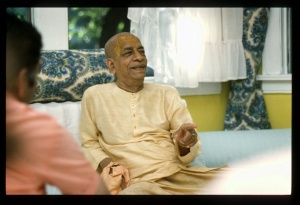CC Antya 13.113

A.C. Bhaktivedanta Swami Prabhupada
TEXT 113
- vṛddha mātā-pitāra yāi' karaha sevana
- vaiṣṇava-pāśa bhāgavata kara adhyayana
SYNONYMS
vṛddha — old; mātā-pitāra — of the mother and father; yāi — going back; karaha sevana — engage in service; vaiṣṇava-pāśa — from a pure Vaiṣṇava; bhāgavata — Śrīmad-Bhāgavatam; kara adhyayana — study.
TRANSLATION
Śrī Caitanya Mahāprabhu said to Raghunātha Bhaṭṭa, "When you return home, serve your aged father and mother, who are devotees, and try to study Śrīmad-Bhāgavatam from a pure Vaiṣṇava who has realized God."
PURPORT
One should note how Śrī Caitanya Mahāprabhu, the Supreme Personality of Godhead, advised Raghunātha Bhaṭṭācārya to learn Śrīmad-Bhāgavatam. He advised him to understand Śrīmad-Bhāgavatam not from professional men but from a real bhāgavata, a devotee. He also advised Raghunātha Bhaṭṭa to serve his mother and father because they were both Lord Caitanya’s devotees. Anyone who wishes to advance in Kṛṣṇa consciousness must try to serve the devotees of Kṛṣṇa. As Narottama dāsa Ṭhākura says, chāḍiyā vaiṣṇava-sevā nistāra peyeche kebā: “Without serving a self-realized Vaiṣṇava, no one has ever been released from the materialistic way of life.” Śrī Caitanya Mahāprabhu would have never advised Raghunātha Bhaṭṭa to serve ordinary parents, but since his parents were Vaiṣṇavas, the Lord advised him to serve them.
One might ask, “Why shouldn’t ordinary parents be served?” As stated in Śrīmad-Bhāgavatam (SB 5.5.18):
- gurur na sa syāt sva-jano na sa syāt
- pitā na sa syāj jananī na sā syāt
- daivaṁ na tat syāt na patiś ca sa syān
- na mocayed yaḥ samupeta-mṛtyum
“One who cannot deliver his dependent from the path of birth and death should never become a spiritual master, a relative, a father or mother, or a worshipable demigod, nor should such a person become a husband.” Everyone naturally gets a father and mother at the time of birth, but the real father and mother are those who can release their offspring from the clutches of imminent death. This is possible only for parents advanced in Kṛṣṇa consciousness. Therefore any parents who cannot enlighten their offspring in Kṛṣṇa consciousness cannot be accepted as a real father and mother. The following verse from the Bhakti-rasāmṛta-sindhu (1.2.200) confirms the uselessness of serving ordinary parents:
- laukikī vaidikī vāpi yā kriyā kriyate mune
- hari-sevānukūlaiva sa kāryā bhaktim icchatā
"One should perform only those activities—either worldly or prescribed by Vedic rules and regulations—which are favorable for the cultivation of Kṛṣṇa consciousness."
Concerning the study of Śrīmad-Bhāgavatam, Śrī Caitanya Mahāprabhu clearly advises that one avoid hearing from a non-Vaiṣṇava professional reciter. In this connection Sanātana Gosvāmī quotes a verse from the Padma Purāṇa:
- avaiṣṇava-mukhodgīrṇaṁ pūtaṁ hari-kathāmṛtam
- śravaṇaṁ naiva kartavyaṁ sarpocchiṣṭaṁ yathā payaḥ
"No one should hear or take lessons from a person who is not a Vaiṣṇava. Even if he speaks about Kṛṣṇa, such a lesson should not be accepted, for it is like milk touched by the lips of a serpent." Nowadays it is fashionable to observe Bhāgavata-saptāha and hear Śrīmad-Bhāgavatam from persons who are anything but advanced devotees or self-realized souls. There are even many Māyāvādīs who read Śrīmad-Bhāgavatam to throngs of people. Many Māyāvādīs have recently begun reciting Śrīmad-Bhāgavatam in Vṛndāvana, and because they can present the Bhāgavatam with word jugglery, twisting the meaning by grammatical tricks, materialistic persons who go to Vṛndāvana as a matter of spiritual fashion like to hear them. All this is clearly forbidden by Śrī Caitanya Mahāprabhu. We should note carefully that since these Māyāvādīs cannot personally know the meaning of Śrīmad-Bhāgavatam, they can never deliver others by reciting it. On the other hand, an advanced devotee of the Lord is free from material bondage. He personifies Śrīmad-Bhāgavatam in life and action. Therefore we advise that anyone who wants to learn Śrīmad-Bhāgavatam must approach such a realized soul.